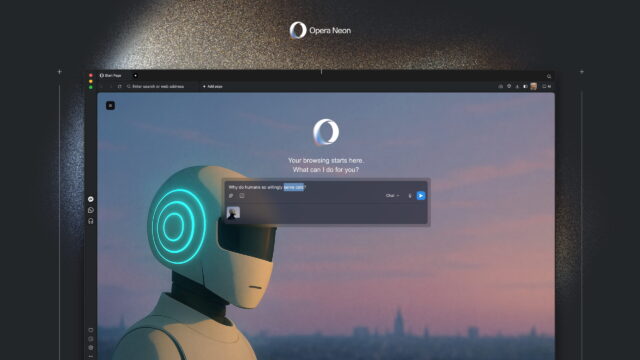Opera begins rolling out Opera Neon, its AI-powered browser

Opera has begun rolling out Opera Neon, a subscription-based browser designed around agentic AI. The first wave of invitations is being sent to users in the Neon Founders program, with broader access set to follow.
Unlike the normal Opera browser, Opera Neon is intended for people who use AI as part of their everyday work. It combines standard browsing tools with a system of workspaces, cards, and agentic actions.
The purpose is to reduce the friction of switching between research, writing, planning, and other tasks spread across multiple tabs and assistants.
At the center of the browser is the concept of Tasks. These are self-contained workspaces that keep context within a project, allowing the browser’s AI features to analyze and act across multiple sources without interference from unrelated tabs. A task could include a mix of research pages, chat conversations, and documents, with Neon’s AI features operating within that scope.
Opera Neon introduces two functions called Neon Chat and Neon Do. Chat, unsurprisingly, provides conversational support inside a task, while Do is designed to take action.
Do operates directly in the browser session, where the user is already logged in, rather than through external cloud services. This allows it to open or close tabs, perform actions across websites, and adapt in real time, whether gathering information, filling out forms, or shopping. Users can pause or take over at any point.
Opera Neon Cards
Another feature is Cards, which act like reusable instructions for AI prompts. Adding a card adjusts the AI’s output, and users can combine multiple cards for different outcomes. Cards can be created individually or shared through a community store, with uses ranging from comparing products to capturing meeting notes.
For building content, Opera Neon includes Make, a tool that produces outputs such as websites, reports, or games. These results are delivered with source files for editing and can be shared through a generated URL. Processing takes place on Opera’s European servers, and work can continue even when offline.
Alongside its AI functions, Opera Neon includes standard Opera features, such as an ad blocker, VPN, bookmarks, and sidebar integrations.
Although Opera’s existing browsers already provide AI integrations, Neon is described as a premium product aimed at users who want an AI-focused browsing experience.
Opera Neon is currently available by invitation, with wider availability expected in the coming weeks. Interested users can join the waitlist here.
What do you think about Opera’s launch of Neon? Let us know in the comments.
